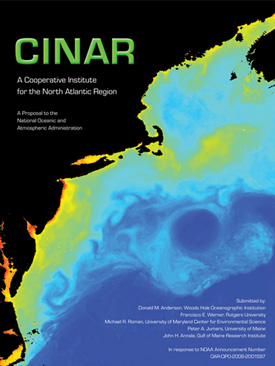Cambridge, Md. (October 20, 2009) – Federal and academic marine scientists in the Northeast have combined resources in a new effort to understand how the large marine ecosystem off the northeastern U.S. functions. The University of Maryland Center for Environmental Science (UMCES) is partnering with the National Oceanic and Atmospheric Administration (NOAA) and several leading marine research institutions on a multi-year research collaborative that brings together more than 200 ocean scientists in an effort to better understand the complexities of North Atlantic region.
 “The Cooperative Institute for the North Atlantic Region (CINAR) brings together academic scientists and ocean management agencies to conduct and coordinate cutting-edge research,” said UMCES Horn Point Laboratory Director and CINAR researcher Dr. Michael Roman. “By linking NOAA managers and academic scientists, CINAR will help develop programs and policies that will lead to sustainable and beneficial management of the U.S. Northeast continental shelf ecosystem.”
“The Cooperative Institute for the North Atlantic Region (CINAR) brings together academic scientists and ocean management agencies to conduct and coordinate cutting-edge research,” said UMCES Horn Point Laboratory Director and CINAR researcher Dr. Michael Roman. “By linking NOAA managers and academic scientists, CINAR will help develop programs and policies that will lead to sustainable and beneficial management of the U.S. Northeast continental shelf ecosystem.”
In addition to NOAA and UMCES, academic partners include the Woods Hole Oceanographic Institution, Rutgers University, the University of Maine, and the Gulf of Maine Research Institute.
Although still in its infancy, the institute partners are already working on several projects. Among them are efforts to apply advanced technologies to the next generation of fishery stock surveys, to understand whether there is a link between marine mammal health and risk of entanglement in fishing gear, to better predict the occurrence and intensity of harmful algal blooms (red tides) in Northeast coastal waters, and to test and evaluate new forms of fishery management.
“The CINAR partnership will allow NOAA and our academic partners to collaborate on research that is critical to the ecological future of Chesapeake Bay and waters off of the Atlantic Coast,” said Peyton Robertson, director of the NOAA Chesapeake Bay Office. “This model program will provide policymakers with the scientific understanding necessary for wisely managing coastal and ocean ecosystems.”
The University of Maryland Center for Environmental Science is the principal research institution for advanced environmental research and graduate studies within the University System of Maryland. UMCES researchers are helping improve our scientific understanding of Maryland, the region and the world through its three laboratories - Chesapeake Biological Laboratory in Solomons, Appalachian Laboratory in Frostburg, and Horn Point Laboratory in Cambridge - and the Maryland Sea Grant College.
# # #
